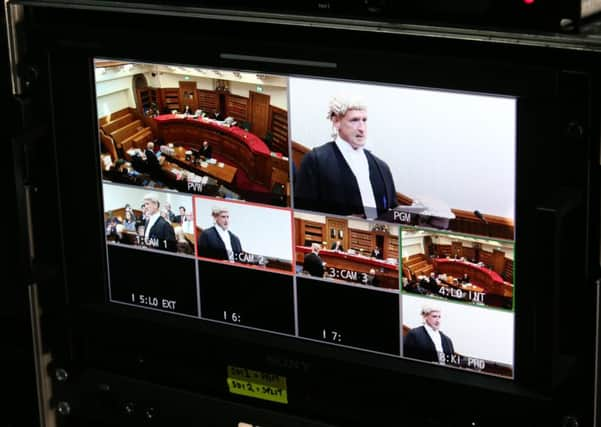Alistair Carmichael ‘broke electoral law’ at TV denial


Advocate Jonathan Mitchell QC told judges Lady Paton and Lord Matthews at the election court in Edinburgh that the politician breached legal requirements when he spoke to a Channel 4 journalist about a controversial Daily Telegraph story.
The Liberal Democrat MP was speaking to a reporter about when he became aware that a memo detailing the alleged contents of a conversation between the First Minister Nicola Sturgeon and the French ambassador to Britain.
Advertisement
Hide AdAdvertisement
Hide AdThe memo formed the basis of a Telegraph story headlined “Nicola Sturgeon Secretly Backs David Cameron.” It was published in the run-up to this year’s general election.


Mr Carmichael told the hack that he didn’t know that a leak had taken place until a journalist had phoned him about it.
The court had earlier heard that Euan Roddin, a former special advisor to the Scottish Secretary, had the permission of Mr Carmichael to leak the story to the Telegraph.
On Tuesday, Mr Mitchell told the election court that Mr Carmichael had told an “untruth” when he denied knowing about the memo.
He said this denial breached section 106 of the Representation of the Peoples Act.
The legislation states that a person will be guilty of an illegal practice if before or during an election, for the purpose of affecting the return of a candidate, they make or publish a false statement of fact over a candidate’s personal character or behaviour.
Arguing that Mr Carmichael communicated this untruth in a bid to influence the outcome of the election, Mr Mitchell said: “This is fundamental, dishonourable conduct.”
Mr Mitchell was speaking on the second day of proceedings at the election court. It is only the second time in 50 years that the election court has convened. On this occasion, it convened at Edinburgh’s Court of Session.
Advertisement
Hide AdAdvertisement
Hide AdIt was also the first time in Scottish legal history that court proceedings have been broadcast live and without interruption on television.
The case was brought to court over events which took place during this year’s general election.
The Daily Telegraph published a story about remarks which Nicola Sturgeon allegedly made to the French ambassador during a meeting.
It claimed she had told the diplomat that she preferred to see the Tory leader continue as Prime Minister.
Two days later the Cabinet Secretary, Sir Jeremy Heywood, ordered an inquiry into the leak and Mr Carmichael was also interviewed on the subject by Channel 4 news.
The probe later concluded that Euan Roddin, a former special advisor to the Scottish Secretary, had the permission of Mr Carmichael to leak the story to the Telegraph.
Mr Carmichael, who won Orkney and Shetland with an 817 majority, left his government role without severance pay.
The constituents who brought the petition, Timothy Morrison, Phemie Matheson, Fiona Grahame and Carolyn Welling, all of Orkney, were aided by crowd funding.
Advertisement
Hide AdAdvertisement
Hide AdThey maintain that Mr Carmichael’s statement on when he first became aware of the leak of the memo took place before the election was untruthful.
The MP - who was elected in 2010 with a 9,928 majority - claims that he didn’t breach election law because he didn’t make a false statement of fact with regard to the personal character or conduct of a candidate before or during an election for the purpose of affecting votes.
On Tuesday, Mr Mitchell argued that Mr Carmichael’s behaviour did breach the Representation of the Peoples Act.
Mr Carmichael was not present in court on Tuesday.
Mr Mitchell said that the actual leaking of the memo didn’t breach electoral laws but it was Mr Carmichael’s subsequent denial of not knowing anything until a journalist had made him aware of the leak that had broken electoral law.
He added: “The false statement is his denial.”
The hearing before Lady Paton and Lord Matthews continues.